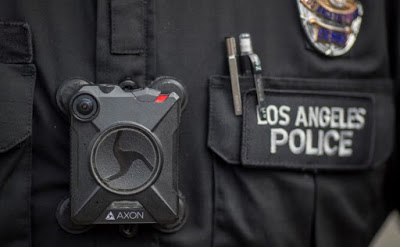Police officers in Mason District selected for a body camera pilot program
 |
| An Axon body camera. [CNN Money] |
Beginning this spring, patrol officers from the Mason and Mount Vernon police districts will begin wearing body cameras under a pilot program approved by the Fairfax County Board of Supervisors Nov 21.
The program is designed to give the Fairfax County Police Department an “opportunity to review police-community member encounters as they occur, as well as provide an additional degree of safety for our officers as they patrol the streets,” the FCPD states.
The pilot, to include 230 cameras, will last for three months with an option to extend it to six months. The program was approved in response to a recommendation by the Ad Hoc Police Practices Review Commission.
Cameras will be worn on the outside of an officer’s uniform or ballistic vest on a full-time basis to evaluate the technical merits of the software and equipment. The cameras that will be tested offer various features and mounts.
Officers will be expected to activate the camera during any law enforcement-public encounter related to a call for service, law enforcement action, subject stop, traffic stop, search, or police service. Officers would start recording as soon as they arrive or as soon as practical and leave the camera on for the duration of the incident. That includes transporting an individual to a detention facility.
“No law prohibits officers from recording citizens in public, as individuals in a public area have no expectation of privacy,” the FCPD states.
“The recording of any police contact with individuals in a private residence is also allowed, as long as the officers have legal authority to be in that location,” the police department continues. “If officers are in an area where individuals have a reasonable expectation of privacy, such as their home, individuals may decline to be recorded unless the recording is being made pursuant to an in-progress criminal investigation, arrest, or search of the location.”
There are several circumstances and locations where police officers will not use body cams, such as courthouses and medical facilities, except in cases where “use of force is anticipated or initiated,” the FCPD says. “We will also not record if community members are reporting a crime and request anonymity or if they are giving a statement in an alleged rape or sexual assault.”
FCPD has selected Axon as the single point of contact for the camera device, software, and storage. [Axon changed its name from Taser International last March signaling its shift from weapons to devices and data storage. At the same time, the company began offering free body cameras to police departments. More than 6,000 police departments are connected to the Axon platform, the company reports.]
While Axon has agreed to provide devices for the FCPD pilot program at no cost, the projected startup cost for the pilot program will be $684,151 in fiscal year 2018.
Most of those costs will be for the personnel needed to technically support the program and help manage the additional digital evidence and records. Approximately $8,000 will be spent at each station to make modest enhancements to power and network access.
The first three years of data storage are covered as part of a field trial agreement with Axon. After that there will be a recurring annual cost for data storage from the 90-day pilot of $124,000 beginning in 2021. If the pilot period duration is increased, the cost would increase proportionately.
Fairfax County is required by state law to maintain the data created during the pilot program. The Library of Virginia is authorized by state code to enact regulations governing the retention and disposition of state and local public records, including digital video data.
Video related to most routine police activity is required to be retained for only a few years, FCPD says. However, cases involving unsolved serious criminal offenses, allegations of police misconduct, and critical incidents can require retention periods of up to 100 years.
In addition to the technical evaluation of the equipment, FCPD is partnering with researchers to gather and study data over the course of the pilot program. Richard Bennett of the Department of Justice, Law and Criminology at American University will conduct a comprehensive evaluation of the body camera program.
Bennett will analyze statistics on the use of force, the number of community member complaints, changes in policing activities, and community members’ assessment of police legitimacy. The analysis is expected to cover a 270-day span including a period before, during, and after the pilot program.
“We acknowledge this is a significant milestone and our policy for the pilot body-worn camera program was drafted with community stakeholders, including leaders of religious, civic, and business organizations,” FCPD states. “There are several intricacies contained within the policy that address the personal privacy rights and constitutional safeguards of individuals while ultimately seeking to promote transparency and accountability in police-community member encounters.”
FCPD expects the program to start in March, which would give the department time to hire staff and make infrastructure improvements to the Mason and Mount Vernon stations.

